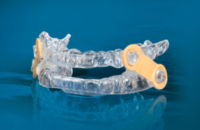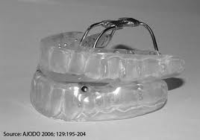According to the National Sleep Foundation, sleep apnea is a disorder in which there is an intermittent cessation of breathing during sleep. According to an estimate, about 18 million US adults suffer from some form or degree of sleep apnea. Although there are numerous reasons which can cause sleep apnea, the most common symptom is the blockage of the airway. Therefore, the management of sleep apnea involves the use of oral appliances which keep the airway open during sleep.
There are two options that are utilized for the management of sleep apnea; continuous positive airway pressure (CPAP) and oral appliances. However, oral appliances are gradually gaining popularity owing to their ease of use and convenience. This article explains how different oral appliances work and how they are beneficial in treating sleep apnea.
 ORAL APPLIANCES FOR SLEEP APNEA
ORAL APPLIANCES FOR SLEEP APNEA
The oral appliances for the management of sleep apnea are worn in the mouth. Just like mouthguards worn by sportsmen, or removable retainers used in orthodontic treatment. Due to their increasing popularity, more than 100 different types of oral sleep apnea appliances have been approved by the FDA.
The oral appliances work by maintaining your lower jaw in a forward position. This prevents the tongue from falling back, and the muscles from collapsing and occluding the airway, which can otherwise block the airflow to the lungs. When the lower jaw remains in a forward position, the airway remains open and there is no interruption in the breathing cycle.
The American Academy of Sleep Medicine has approved oral appliances as a first-line treatment option for managing sleep apnea. The oral appliances are also suitable for individuals who have neuromuscular problems, or those who cannot tolerate the CPAP appliances. In some cases, your dentist may also recommend a treatment regimen that combines the use of oral appliances as well as CPAP.
 WHAT ARE THE ADVANTAGES OF ORAL APPLIANCES?
WHAT ARE THE ADVANTAGES OF ORAL APPLIANCES?
The most significant advantage of oral appliances for the management of sleep apnea is their comfort and convenience, as most of the patients can use them without any problem. Once patients have been instructed regarding the optimal method of wearing and removing their appliances, it becomes very easy for them. Unlike the other management options such as CPAP, which require extensive skill and knowledge of using the equipment.
Another benefit of oral appliances is their portability. Unlike the larger equipment used in other treatment options, you can easily take your oral appliances along with you wherever you go. So, no matter how far you travel, you can always take your oral appliance with you to ensure that you sleep well while you’re away from home.
Perhaps, the most important benefit of oral appliances is their ease of cleaning and maintenance. Whenever you want, you can simply remove your oral appliances and clean it rinsing it lukewarm water. Other electronic appliances require frequent maintenance by technical staff, which is not only costly but also time-consuming.
Now, here you might be thinking “oral sleep apnea appliances are also available at supermarkets. Why should I go to a dentist for getting one?” good question. While the “boil and bite” appliances may be cheaper, and readily available. They can never be as comfortable, accurately fitting, and effective as the custom-made appliances at the dentist’s office. The custom-made appliances are fabricated under controlled conditions by trained laboratory staff. Who ensure that the appliance is not only comfortable but also fits your mouth perfectly. So, if you feel that you or anyone among your loved ones is suffering from sleep apnea. Getting a custom-made oral appliance for the treatment is always a good idea.
Sleep apnea is may seem to be a small problem. However it can have lasting effects on your oral and physical health. Therefore, it is essential that you seek immediate treatment to prevent permanent damage. The management of this problem usually involves a team effort by your dentist, doctor and sleep specialists. However, the outcome of treatment is primarily dependent on your ability to adhere to the doctor’s instructions. You can fully recover from the effects of sleep apnea if the treatment is timely.



